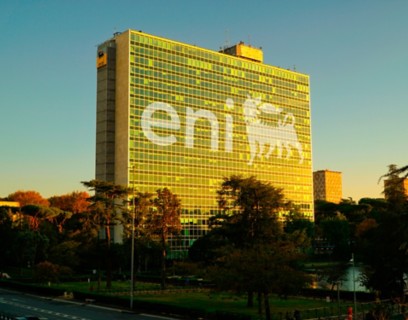
Or , our new artificial intelligence tool.
MyEni Login
World Energy Transitions Outlook 2023 - 1.5°C Pathway
The official presentation of the IRENA report on the energy transition took place on 4 July 2023.

days
hours
minutes
seconds
World Energy Transitions Outlook 2023 - 1.5°C Pathway
The third edition of the IRENA World Energy Transitions Outlook
On 4 July 2023, at Gazometro complex in Rome and live streamed, Eni presented the first volume of the IRENA World Energy Transitions Outlook: 1.5°C Pathway (WETO 2023) in collaboration with the International Renewable Energy Agency (IRENA).
The meeting was attended by Vannia Gava, Vice Minister of the Environment and Energy Security, Clara Poletti, Commissioner - ARERA and Chairperson of the Board of Regulators - ACER, Francesco La Camera, Director General IRENA, Claudio Descalzi, Eni’s CEO, and Elizabeth Press, Director Planning and Programme Support IRENA. The event is moderated by Reuters journalist Giselda Vagnoni.
The first volume of the report provides an overview of energy transition processes, tracking progress and gaps in all energy sectors. WETO 2023 identifies priority areas and actions based on available technologies that must be implemented by 2030 in order to achieve zero net emissions by 2050.
Video webcast on demand
Highlights from this year’s publication
The scenario outlined by the publication presents a plan to reach the 1.5°C target by 2050. The most significant aspects are:
- The new report describes the trajectory the energy sector has to take to stay within the 1.5°C scenario until 2050.
- Some progress has been made, but there is still not enough investment in renewables and it mainly focuses on a limited number of countries and technologies.
- More investment is needed in transitional energy technologies (hydropower, geothermal energy, sustainable biomass, clean hydrogen) as well as in sectors using lower shares of renewable energy (heating and transport).
- The COP28 will be a crucial moment to give new impetus to the energy transition whose main drivers are energy efficiency, electrification, expansion of electricity grids and flexibility.
- Barriers to the energy transition need to be removed through 3 main areas of intervention: investment in physical infrastructure; the adaptation of policies and regulatory frameworks; and providing the skills needed for the energy transition.
- Alongside private investment, significant public investment and policies are needed to ensure that interventions are uniform in terms of technology and geography.
- A successful energy transition requires strong and redesigned international cooperation.
- Developing countries must be supported by providing them with access to technology, training, capacity building and affordable finance.
Eni and the International Renewable Energy Agency
We have initiated a partnership with IRENA that aims to facilitate dialogue and share respective experiences to accelerate the energy transition and the development of renewable energy in fossil fuel exporting countries. The agreement also aims to identify obstacles to private sector investment in renewable energy in countries where Eni operates and to foster coordinated solutions with governments with a special focus on biofuels, marine energy and offshore renewables.
Thanks to this partnership, a Capacity Building on Biofuels training programme has been organised for ministerial officials in African countries, with Eni leading the dissemination of knowledge on biofuel issues. Between 2023 and 2024, the programme will continue to involve a total of 11 African countries.
Find out more about the Capacity Building initiative.

If you want to change topic, clear the chat and make a new query to receive more relevant results.
This will delete the question history.
Clear chat
If you want to change topic, clear the chat and make a new query to receive more relevant results. This will delete the question history.
Here you can find the full list of your queries.
The answers are generated by artificial intelligence, therefore they may contain inaccuracies. Please read the terms and conditions of use.

A new window into Eni’s world
EnergIA is an innovative tool based on artificial intelligence capabilities, which can help you navigate the contents of eni.com, quickly finding answers to your questions. EnergIA can also perform a search on a specific topic, providing the most up-to-date data available, or it can invite you to delve deeper into a topic of your interest by suggesting links and specific readings. Start now!
EnergIA is an innovative tool based on artificial intelligence capabilities, which can help you navigate the contents of eni.com, quickly finding answers to your questions. Start now!
Type your question here, and I’ll do my best to answer you!
How does EnergIA work?
EnergIA (ener'dʒia) is a system based on Generative Artificial Intelligence.
Thanks to this technology, we can respond to your requests by querying the most relevant content and documents available on eni.com. (Note: financial documents from the last 12 months and press releases from the last 2 years are considered.)
Through EnergIA, you can delve into topics of interest and have a real-time window into the world of Eni.
If you wish to search for a specific document, press release or news, use the traditional search engine via the magnifying glass icon.
Like all systems that leverage Generative Artificial Intelligence, EnergIA may generate inaccurate or outdated responses. Always consult the sources that EnergIA proposes as the origin of the generated information.
If the system fails to find an exact match for the requested content, it still tends to provide a response.
If you find any inaccuracies in the provided response, please send us your feedback at the bottom of the page: it will be very helpful for us to improve.
Remember that the content generated by the system does not represent Eni’s official position. We therefore invite stakeholders to refer to their designated contacts for official statements: Press Office for journalists, Investor Relations for analysts and investors, Company Secretariat for shareholders etc..
EnergIA can understand questions posed in almost all languages, but we prefer to provide you with a response in English or Italian, the two languages available on eni.com. If you ask a question in Italian, the content on the site in Italian will be consulted. If you ask it in English or any other language, the content in English will be consulted. (Note: the language Eni uses for financial documents/content is predominantly English.)
If questions are formulated that violate the set security criteria, the system will not proceed with processing the response. Please remember not to send personal data.
By using this service, the users acknowledge that they have read and accepted the terms and conditions of use.
Search
My searches
How does EnergIA work?
EnergIA (ener'dʒia) is a system based on Generative Artificial Intelligence.
Thanks to this technology, we can respond to your requests by querying the most relevant content and documents available on eni.com. (Note: financial documents from the last 12 months and press releases from the last 2 years are considered.)
Through EnergIA, you can delve into topics of interest and have a real-time window into the world of Eni.
If you wish to search for a specific document, press release or news, use the traditional search engine via the magnifying glass icon.
Like all systems that leverage Generative Artificial Intelligence, EnergIA may generate inaccurate or outdated responses. Always consult the sources that EnergIA proposes as the origin of the generated information.
If the system fails to find an exact match for the requested content, it still tends to provide a response.
If you find any inaccuracies in the provided response, please send us your feedback at the bottom of the page: it will be very helpful for us to improve.
Remember that the content generated by the system does not represent Eni’s official position. We therefore invite stakeholders to refer to their designated contacts for official statements: Press Office for journalists, Investor Relations for analysts and investors, Company Secretariat for shareholders etc..
EnergIA can understand questions posed in almost all languages, but we prefer to provide you with a response in English or Italian, the two languages available on eni.com. If you ask a question in Italian, the content on the site in Italian will be consulted. If you ask it in English or any other language, the content in English will be consulted. (Note: the language Eni uses for financial documents/content is predominantly English.)
If questions are formulated that violate the set security criteria, the system will not proceed with processing the response. Please remember not to send personal data.
By using this service, the users acknowledge that they have read and accepted the terms and conditions of use.
Disclaimer
Type your question here, and I’ll do my best to answer you!
Use Eni’s new artificial intelligence
A new window into Eni’s world, at your disposal. EnergIA is an innovative tool based on artificial intelligence capabilities, which can help you navigate the contents of eni.com, quickly finding answers to your questions.
















